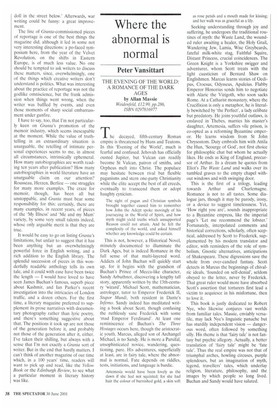Where the abnormal is normal
Peter Vansittart
THE EVENING OF THE WORLD: A ROMANCE OF THE DARK AGES by Allan Massie
Weidenfeld, £12.99, pp.286, ISBN 0297816977
The decayed, fifth-century Roman empire is threatened by Huns and Teutons. In this 'Evening of the World', much is fearful and confused. Jehovah has officially ousted Jupiter, but Vulcan can readily become St Vulcan, patron of smiths, and Orpheus melt into Christ. The populace may hesitate between rival but flexible paganisms and stern one-party Christianity while the elite accept the best of all creeds, eventually to transcend them or adopt haughty cynicism.
The sight of pagan and Christian symbols brought together caused him to remember how John the Adept spoke movingly of his journeying in the World of Spirit, and how myth might yield truths which unsupported Reason could not attain. And he felt the complexity of the world, and asked himself whether any knowledge could be certain.
This is not, however, a Historical Novel, minutely documented to illuminate the Dark Ages, but is indeed Romance in the full sense of that multi-layered word. Addicts of John Buchan will quickly start up, for it begins with the grandson of Buchan's Prince of Mecca-like character, Sandy Arbuthnot, discovering a lengthy tall story, apparently written by the 13th-century 'wizard', Michael Scott, mathematician, astrologer, tutor to Emperor Frederick II, Stupor Mundi, both resident in Dante's Inferno. Sandy indeed has meditated writing a book about Scott, though confusing the ruthlessly sane Frederick with some 'mad Emperor Ferdinand'. At least one reminiscence of Buchan's The Three Hostages occurs here, though the aristocratic youth, Marcus, alleged son of Archangel Michael, is no Sandy. He is more a Parsifal, unsophisticated novice, wandering, questioning, pure. His adventures, superficially at least, are in fairy tale, where the abnormal is normal, Fate depends on riddles, tests, initiations, and language is bardic.
Artemesia would have been lovely as the dawn if she had not squinted; for she had hair the colour of burnished gold, a skin soft as rose petals and a mouth made for kissing; and her walk was as graceful as a lily.
Seeking understanding through joy and suffering, he undergoes the traditional routines of myth: the Waste Land, the wounded ruler awaiting a healer, the Holy Grail, Wandering Jew, Lamia, Wise Greybeards, fateful milk-white stag, Faithful Squire, Distant Princess, crucial coincidences. The Green Knight is a Yorkshire swigger and adventurer, whom Scott treats with the light causticism of Bernard Shaw on Englishmen. Marcus learns stories of Oedipus, Croesus, Odysseus, Apuleius. Flabby Emperor Honorius sends him to negotiate with Alaric the Vizigoth, who soon sacks Rome. At a Catharist monastery, where the Crucifixion is only a metaphor, he is literally bewitched by the Perfect', a lady celibate but predatory. He joins youthful outlaws, is enslaved in Thebes, marries his master's daughter, Artemesia, suffers vile prison, is co-opted as a reforming Byzantine emperor. He learns wisdom from St John Chrysostom. Duty embroils him with Attila the Hun, 'Scourge of God', not first choice for philosophic chat but whom he actually likes. He ends as King of England, precursor of Arthur. In a dream he quotes from Eliot's The Waste Land and walks over its tumbled graves to the empty chapel without windows and with swinging door.
This is the first of a trilogy, leading towards Arthur and Charlemagne. Romance is not to all tastes. Some dialogue jars, though it may be parody, irony, or a device to suggest timelessness. Yet, 'How right you are', sounds inappropriate to a Byzantine empress, like the imperial page's 'Let me recommend the lobster.' Fortunately, interpolated comments and historical corrections, scholarly, often sceptical, addressed by Scott to Frederick, supplemented by his modern translator and editor, with reminders of the role of symbolism, Gnostic alternatives, anticipations of Shakespeare. These digressions save the whole from over-candied fantasy. Scott detects in Marcus the beginnings of chivalric ideals, 'founded on self-denial', seldom obeyed to the letter, never by Frederick. That great ruler would more have absorbed Scott's assertion that torturers first lead a victim to acquiesce in his misfortune, then to love it.
This book is justly dedicated to Robert Nye, who likewise conjures vast worlds from familiar tales. Massie, enviably versatile, may lack Nye's linguistic panache but has sturdily independent vision — dangerous word, often followed by something silly. His theme is that 'fairy tale' is not fantasy but psychic allegory. Actually, a better translation of 'fairy tale' might be 'fate tale'. Thus the real empire was not that of triumphal arches, howling circuses, purple splendours, but an imagination of myth, legend, travellers' tales, which underlay religion, literature, philosophy, and the images by which people so long lived. Buchan and Sandy would have saluted.










































































 Previous page
Previous page